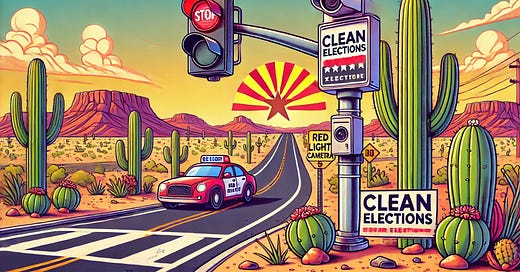Traffic Tickets to Campaign Coffers: The Hidden Flow of Photo Radar Money into Politics
State 48 News explores how funds from photo radar tickets funnel into AZ’s Clean Elections system, sparking debate over whether the program ensures fair campaigning or creates a conflict of interest.
This week, State 48 News broke the story on the Red Light Camera bills moving through the Arizona State Senate. With new developments unfolding, we’re back with an update to unpack the many layers of this evolving issue.
Two Republican-led bills moving forward address traffic photo enforcement - but in opposing ways.
ONE TO BAN. ONE TO EXPAND. HERE’S A WHO’S WHO.
SB 1019: Sponsored by Senator Wendy Rogers, SB1019 seeks to ban photo radar statewide. Calling traffic photo enforcement a “cash cow”, Rogers makes a case against the technology. (Confident in its support, Rogers had considered a voter resolution (SCR1002), but it was scrapped in yesterday’s meeting.) Instead, SB1019 moved forward with a narrow 4-3 vote in the Senate Committee on Public Safety.
Senators Frank Carroll and Kevin Payne introduced SB 1146, a competing bill aiming to expand red-light cameras.
Keep reading with a 7-day free trial
Subscribe to State 48 News to keep reading this post and get 7 days of free access to the full post archives.





